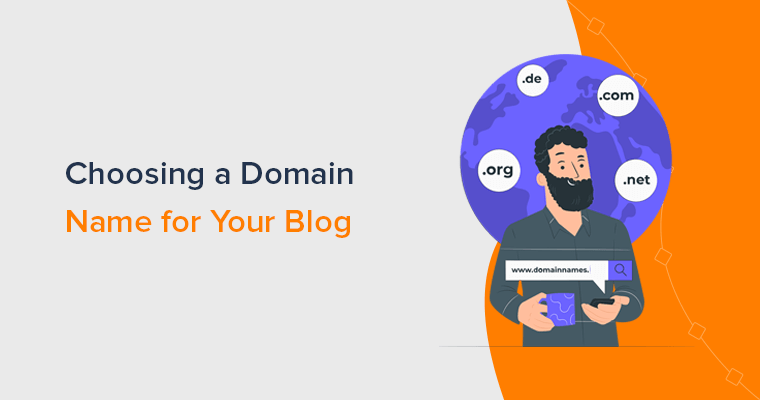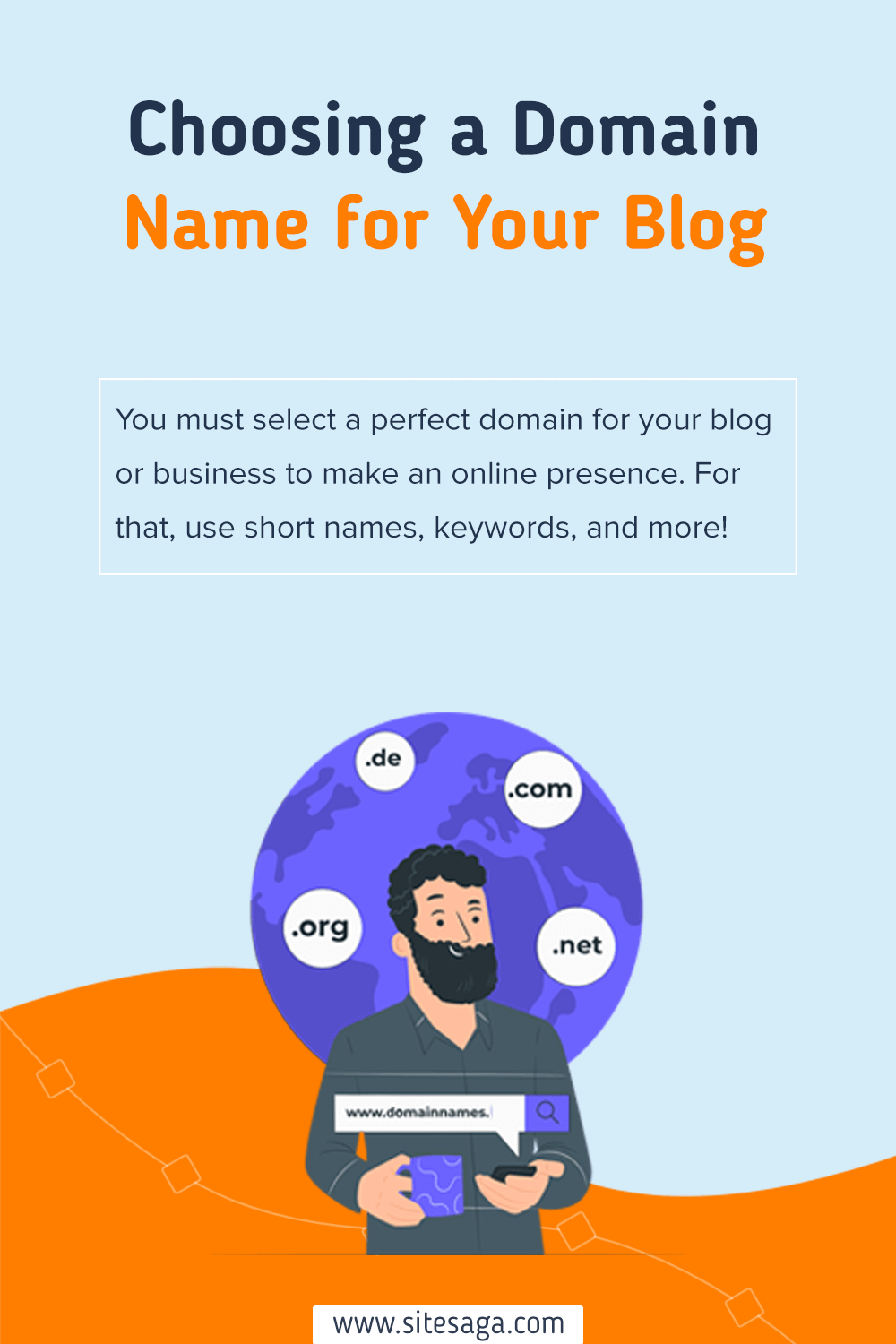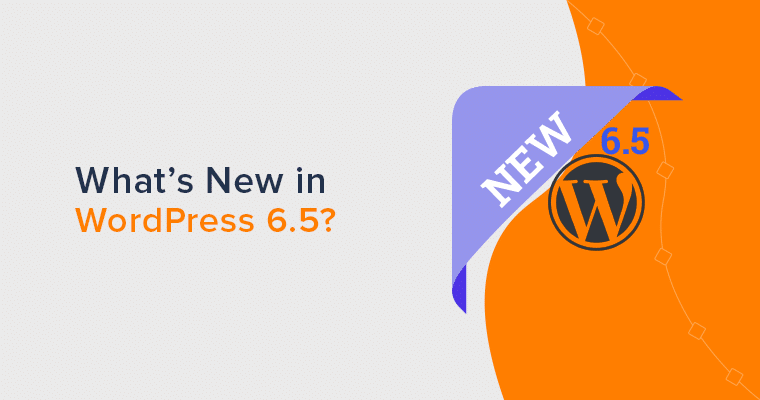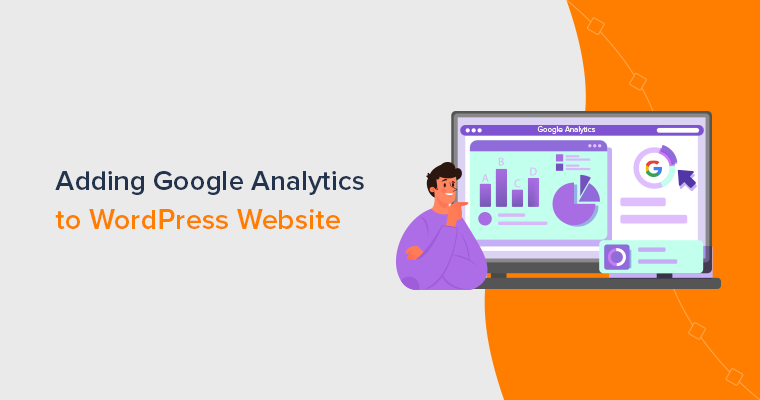Are you curious about how to choose a domain name for your blog or business? Or thinking about changing the current domain name of your business? If yes, then you’ve landed in the right place to learn.
A domain name is an important aspect of any online presence. When starting a blog or business, choosing the right domain name is crucial. It serves as the online address for your website and plays a significant role in establishing your brand.
However, with so many options available, it can be overwhelming to decide on the perfect domain name. In this article, we’ll guide you through the process of selecting a domain name that aligns with your brand and represents your online presence.
So, let’s get started!
What is a Domain Name?
Before starting with the tips on how to choose a domain name for your blog, let’s take a quick look at what is a domain name.
A domain name is a unique identifier for a website. It serves as the online address for a website, much like a physical address for a house. When a user types a domain name into a web browser, it directs them to the corresponding website.

Moreover, domain names are essential for businesses and bloggers looking to establish an online presence. A domain name is essential to business branding and helps customers find and remember the company’s website. For bloggers, a domain name helps establish credibility and makes it easier for readers to find and revisit the blog.
Various domain names are available for businesses and bloggers to choose from. For example, Generic Top-level Domains (gTLDs) such as .com, .net, and .org.
You can also get Country-code Top-level Domains (ccTLDs) such as .uk and .de. Hence, it’s important to select a domain name that accurately represents your brand and resonates with your target audience.
Do you want detailed information on what a domain name is? You can check our complete guide on what is domain name and how it works.
Why You Should Carefully Choose Your Domain Name?
Before going through the tips on how to choose a domain name for your blog or business. There are several reasons why it’s important to choose your domain name carefully:
- Domain name plays a critical role in branding your blog or business and differentiating it from competitors.
- It also affects the credibility of your website and business in the eyes of potential customers.
- A domain name impacts the ability of people to find your website through word-of-mouth or by typing it directly into their browser.
- An easy-to-spell and memorable domain name makes it simpler for readers to locate and revisit your blog or business website.
- It also impacts Search Engine Optimization (SEO) as it uses the words in the domain name as a ranking factor.
- Also, you can use a domain name in marketing materials, such as business cards and email signatures.
- It’s crucial to carefully check a domain name for trademark conflicts to avoid any legal issues in the future.
- Also, your domain name is crucial to your blog or business identity and can influence how people perceive your brand.
- Plus, choosing an already registered domain can lead to legal disputes or buying it from the current owner.
Now that you know why it’s important to choose a domain for your blog or business carefully. Let’s explore effective tips on how to choose a domain name for your blog.
9 Tips on How to Choose a Domain Name for your Blog or Business
When beginning a blog or business, carefully selecting a domain name is crucial. So that it seamlessly represents and promotes your brand, as it’s a critical decision.
So, here we present some key points before you decide on a domain name. Make sure you go through all the following points and choose a domain name for your blog.
1. Keep it Short and Simple
When selecting a domain name for your blog or business, it’s crucial to ensure that it’s both short and easy to remember. As a result, visitors will have an easier time finding and returning to your website. Also, you must balance comprising relevant keywords and keeping the name concise and easy to remember.

Notably, keeping your domain name under 15 characters is recommended. As longer domain names may be difficult for users to remember and type correctly. Hence, which can lead to a loss of traffic due to typos.
Furthermore, while including keywords can be beneficial, it’s essential to prioritize a domain name that is short and easy to remember and spell.
2. Use Keywords
When choosing a domain name for your blog or business, include keywords that inform search engines about the focus of your website. Potentially, this improves search engine rankings when coupled with quality content and good user experience.

However, finding an available domain name that contains your desired keywords can be challenging. Therefore, it requires creativity and a combination of words for your blog or business.
Additionally, it’s crucial to keep the domain name short and memorable while conducting keyword research to guide the selection process.
Furthermore, focusing on keywords with low to medium competition can increase the chances of ranking. So, ensure that the domain name aligns with your blog or business brand.
3. Avoid Hyphens and Numbers
When choosing a domain name, it’s essential to consider the potential issues that can arise from using hyphens. Firstly, including hyphens in your domain name can create the impression of a spam domain. Therefore it negatively impacts your blog or business’s reputation.
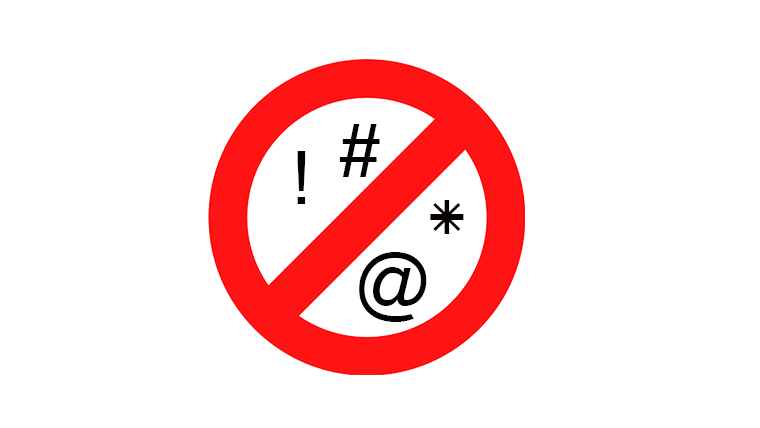
Additionally, it increases the chance of typos. For example, if you choose a domain name with hyphens and numbers because the domain you want is already taken. Your users may end up on your competitor’s website if they forget to type the hyphen.
Therefore, avoiding using hyphens or numbers in your domain name is recommended to avoid confusion and negative associations. Additionally, if the domain you desire is taken, then use other options, like alternative TLDs (Top Level Domain) or different wordings.
4. Choose the Right Domain Extension
When choosing a domain name, domain extension is essential for blog or business websites. The extension is the suffix at the end of the domain name, such as .com, .net, or .org.
It’s also important to consider the purpose and audience of your blog or business when deciding on a domain extension. While .com is the most popular and recognizable extension, others can be more suitable for your blog or business.
For example, .org is commonly used by non-profit organizations and .edu for educational institutions. Similarly, .biz and .info are for business websites. While country-code top-level domains (ccTLD) like .ca for Canada if you’re targeting a specific country.
Moreover, registering multiple domain name extensions can protect your brand from others using the same name on other extensions. So, it’s crucial to consider the options available and how it aligns with your blog or business’s purpose and audience.
5. Think About the Long Run
Choosing a domain name is a critical decision that has long-term implications for your business and blog websites. Your domain name plays a significant role in how people perceive your brand. And this can influence their trust and willingness to engage with your website.
Therefore, choosing a domain name that aligns with your brand is a good idea. Eventually, it can help grow your business and stick with the same domain name in the long run.

One of the key benefits is that it saves you from the costs, time, and effort of changing later on. This involves buying a new domain name, redirecting your website, updating marketing materials, and notifying your audience about the change.
Additionally, for businesses and blogs, it’s crucial to think about scalability and potential growth when choosing a domain name. A generic domain name is more beneficial in the long term, giving more flexibility than a specific domain name.
6. Keep Your Domain Name Unique
You must ensure that your blog or business domain name stands out from competitors and is easily discoverable. So, consider including keywords related to your niche and adding a unique touch through creative elements like puns or wordplay.
Before finalizing your choice, research to ensure the name does not intrude on any trademarks. Or resemble any other existing domain names in your niche.
Another aspect to consider is to make your domain name brandable. Which means that it’s both unique and catchy. Plus, align your domain name with your business name and ensure it’ll effectively target your potential audience.
7. Use a Domain Name Generator
A domain name generator can save time and help you find a unique domain name for your blog or business. With millions of registered domain names, manually searching for a domain name can be time-consuming and generate few options.
It automatically searches for available domain names based on the keywords you provide. Also, these tools generate various clever domain name ideas, making the process of finding an original domain name easy.
We recommend using Namecheap, as it’s a widely used domain name generator. It allows you to enter keywords related to businesses or blogs and generates related domain names. You can also select different TLDs like .com or .net to add to the suggested domain names.
Similarly, Domain.com offers a domain generator tool where users can input keywords. It generates several domain name suggestions and filters and sorts the results according to your preference.
Check our article on the best free domain name generators to get more ideas.
8. Check Domain History
Another important thing to consider is domain history. Specifically, by checking its past usage, you can ensure that it hasn’t been used for any inappropriate or illegal activities. You can use Wayback Machine to view a website’s historical snapshots and how it was used in the past.

Another effective method for checking a domain’s history is through a WHOIS lookup tool. This database stores information about registered domain names, including their ownership and contact information. It also lets you view important details like a domain name’s registration, contact information, and expiration date.
Additionally, another way to verify is to identify if the domain name has been sold multiple times. Also, look out for red flags that may indicate domain hijackings, like sudden changes in domain ownership or contact information.
Similarly, checking if the domain is on any blacklist or spam list is crucial. You can use popular blacklist providers like Spamhaus, SURBL, etc. Hence, you can ensure that it doesn’t have a negative past and is safe for your blog or business.
9. Get Hosting with a Free Domain Name
It’s important to consider not only the name itself but also where you’ll host it. Many hosting providers offer free domain name generators as part of their services.
One example of this is Bluehost, which offers a user-friendly domain name generator. It allows you to search for available domain names by keyword and select different TLDs. By purchasing a hosting package, you can use its free domain name generator to find a unique domain name.
Once you get the right name, you can register it through Bluehost or any other domain registrar and use it for your blog or business website. Furthermore, Bluehost provides various hosting packages to meet different needs, like shared hosting, WordPress hosting, and VPS hosting.
Before choosing a hosting provider, it’s important to compare different options. You need to consider your website’s needs. Also, review the suggested names carefully to ensure that they are relevant to your business or blog.
By following these suggestions, the task on how to choose a domain name for your blog will be easy.
5 Best Domain Registrars for Cheap Domain Names
For your convenience, we’ve compiled a list of the best domain registrar company. So, read over the descriptions, features, and pricing before you settle down for your ideal domain registrar.
1. Namecheap
Namecheap is a popular domain name registration provider and web hosting service. It offers a variety of options to help blogs and businesses register and manage their domain names.
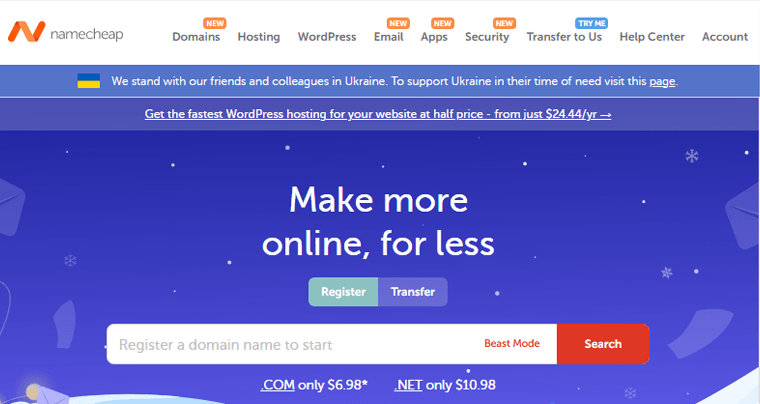
One of the main features is its domain name registration service. You can easily search and register domain names with different TLDs, like .com, .net, .org, .info, and more. It also offers bulk registration options and makes it simple to manage domain names with a user-friendly interface.
In addition to domain name registration, Namecheap also provides web hosting services. They offer various hosting options, like shared hosting, VPS hosting, and dedicated servers. Besides, various plans cater to different websites’ needs, whether a personal blog or a large business website.
Key Features:
- You’ll get a free domain with an all-in-one hosting package deal.
- Keep your data safe with free WHOIS domain privacy protection.
- It also provides a domain price search tool to find the cost of the most popular domain.
- Also, you can easily transfer your website to Namecheap hosting.
Pricing:
Namecheap offers the most affordable prices among domain name registrars, and its pricing is transparent with no additional fees. You can start registering a .com domain at an affordable cost of $7.98 per year.
2. Domain.com
At Domain.com, you’ll have the opportunity to purchase and register various domain extensions. For example, .com, .net, and .org, as well as country-specific domains and new gTLDs. It offers a search tool on its website to assist you in finding an available domain.
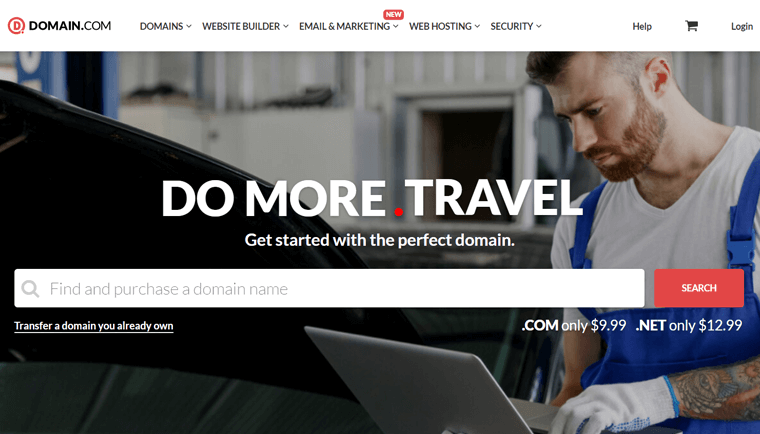
Additionally, you can also get premium domains. They are generally short and easy to remember using popular extensions like .com or .net. Also, they provide the advantage of better branding opportunities. Further, they are more authoritative and credible, bringing trust and professionalism to a site.
To protect your personal information, Domain.com offers domain privacy and protection. This service replaces a registrant’s personal information in the WHOIS record with that of a proxy or privacy service. Also, it helps to find information about a domain. Including the registrant’s name, address, phone number, and email address.
Key Features:
- Domain.com also offers a domain expiration protection service to prevent the accidental loss of a domain.
- It automatically renews domains before they expire, ensuring you can retain ownership of your domains.
- If you own a domain, then easily transfer it to Domain.com by updating the domain’s registrar and nameserver information.
- Also offers over 300 new top-level domains (TLDs) that are already live and available.
Pricing:
Domain.com is a cost-efficient choice for domain name registration. It offers .com domains at $7.99 per year and other extensions at varying prices. You can also look for domains that are in the sale.
3. Bluehost
Bluehost is a web hosting provider that offers various options, including shared hosting, VPS hosting, and dedicated hosting. Along with hosting, it also provides domain registration services, allowing you to register and manage your own domain names.
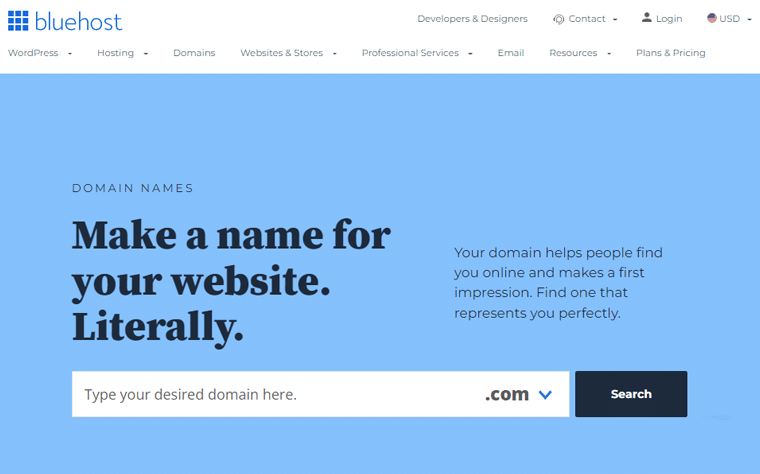
Moreover, it includes a feature to ensure customers don’t lose their domains by accident by offering automatic renewal for domains. When a domain nears its expiration date, the service will automatically renew the registration.
Also, it offers a domain-locking feature that prevents unauthorized domain transfer for added security. This prevents changes to the domain name registration information until it’s unlocked by the domain’s owner or an administrator.
Key Features:
- It offers a wide selection of domain extensions, such as .com, .net, .org, and new gTLDs.
- Bluehost’s domain forwarding feature allows redirecting visitors to the primary website or specific pages with multiple domains.
- Easily manage every aspect of your domains from a single, easy-to-use domain management control panel.
- You can let everyone know where you’re located with geo-location domains.
Pricing:
With Bluehost, you can take advantage of a free domain with their web hosting service, which is available at $2.95 per month. However, if you’re not getting hosting service, then purchase a domain starting from $12.99 for the first year.
If you want to know more, then here’s our full guide on Bluehost web hosting service.
4. GoDaddy
GoDaddy is a web hosting and domain registration company that offers various services. Their main service is domain registration which allows you to register and manage domain names. This includes searching for available domains, registering new ones, and transferring existing domains.
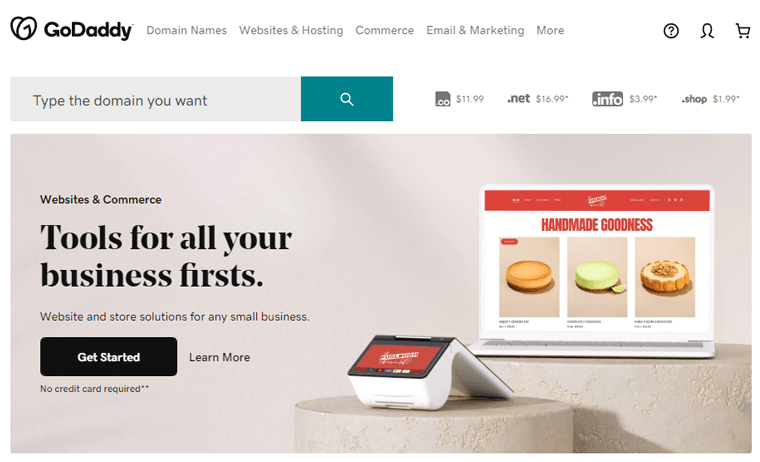
Furthermore, it offers features like an auction service for you to bid on and purchase expired or expiring domain names. So, you’ll be able to obtain a valuable domain name that is no longer in use.
Additionally, it provides a domain value appraisal service, allowing you to determine a domain name’s estimated value. This can be useful if you’re looking to buy or sell a domain.
Key Features:
- It provides a browse domain names option to search for available domain names based on keywords or extensions.
- You’ll have a WHOIS service, a directory of domain names, registration details, and contact information.
- You can get creative domain names by describing your business or idea from a domain name generator.
- This platform offers 84+ million domains for your to choose from.
- You can also sell if you’ve unused domains.
Pricing:
GoDaddy offers some of the most competitive pricing for .com domain names, starting at just $1.99 for the first year of registration. This is the most cost-effective price for domain names available in the market.
5. DreamHost
Another on our list is Dreamhost, a web hosting and domain registration company. It offers a variety of services to its customers. To begin with, one of its services is the generation of domain name ideas. This is helpful if you’re looking to register a new domain name but struggling to develop a good idea.
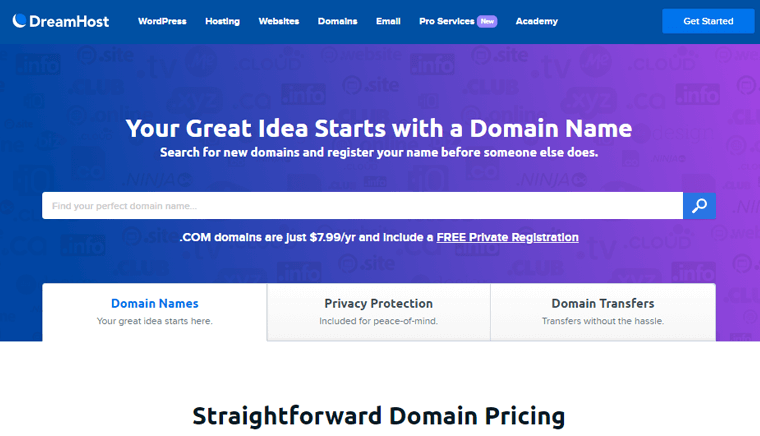
Additionally, you can easily transfer your existing domains to DreamHost. The process is simple and provides step-by-step instructions to ensure a smooth transition.
Moreover, it offers a wide selection of Top-Level Domains (TLDs) with over 400 to choose from. For example, traditional TLDs like .com and .net, as well as newer options like .art and .shop.
Key Features:
- It allows you to create free subdomains, which can be handy if you’ve multiple sites or pages.
- You’ll also have a domain search tool that allows checking the availability of a specific domain name.
- Also, get suggestions for alternative names, saving your time and effort when trying to find an available domain name.
- It comes with 400+ top-level domains as unique as your business.
- Get free private registration for WHOIS Domain Privacy.
Pricing:
Dreamhost offers an affordable option for domain registration, with a subscription starting at $7.99 per year for a .com domain. However, after the first year, the renewal price is $17.99, which is a regular rate.
Other than these, there are several other domain name registrars in the market. Here’s a list of the best domain name registrars for your small business.
Conclusion
That’s it, folks! We believe you’ve clearly grasped how to choose a domain name for your blog or business. And probably have already decided on one.
Yet, if you’re being a bit uncertain, then you can go forward with the pre-sale support service before purchasing. Hopefully, you may now choose the perfect domain name for your blog or business.
Still, have doubts? If yes, then please leave a comment below. We’re always happy to guide you.
Do check out our other articles on how to secure a domain name and how to build a website without hosting and a domain.
Remember to share this article with your friends and family to help them choose the ideal domain name too.
Lastly, follow us on Facebook and Twitter to keep an eye out for new articles and updates.
